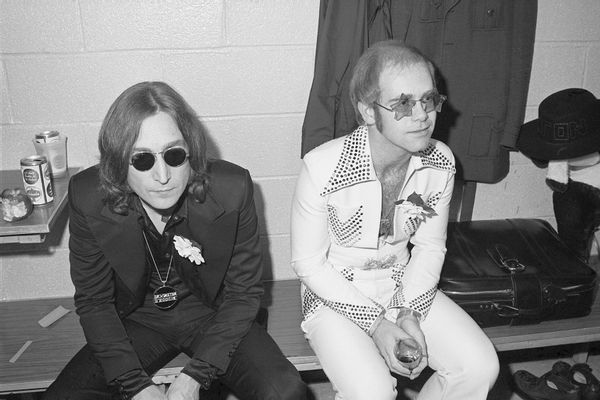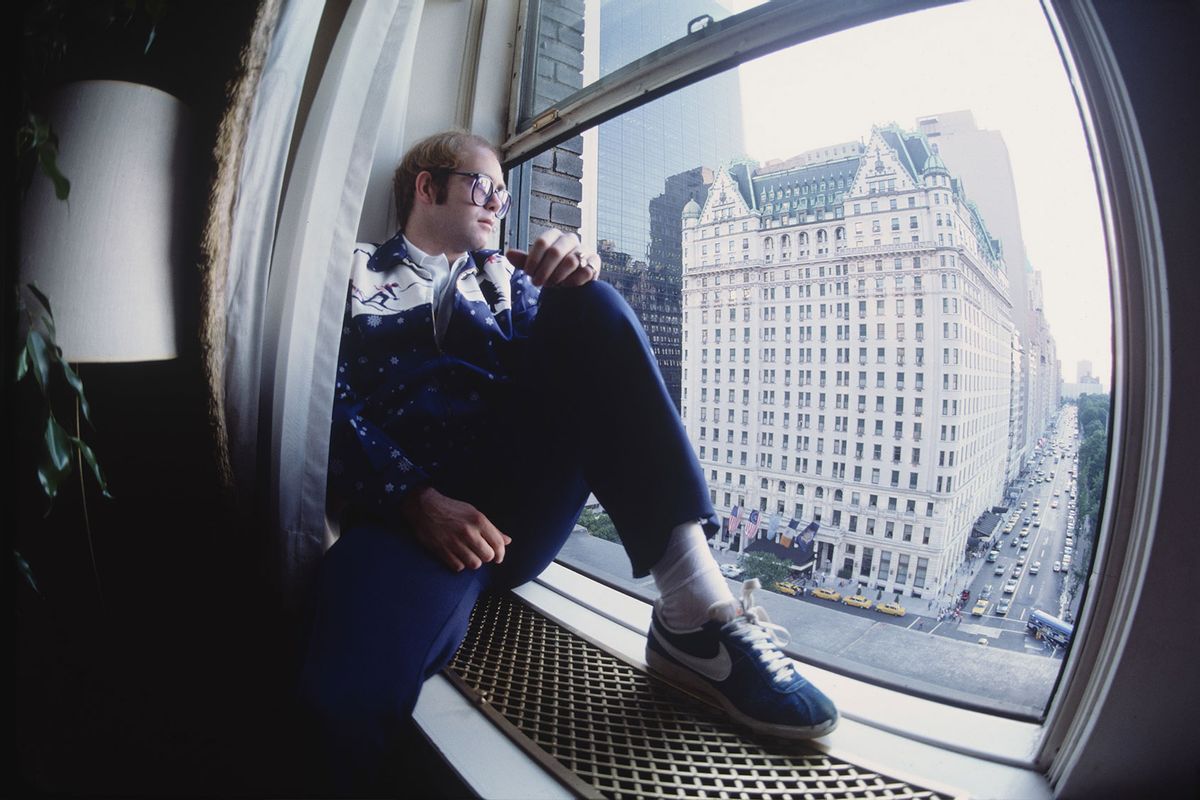Recently, I’d been trying to understand why the news that Elton John had lost his eyesight — at least temporarily — due to an infection felt like a major blow to me. I’ve always valued and respected John as a gay pioneer, but have never been a major fan of his music. To me, his particular brand is more akin to elementary school sing-a-long songs than the types of classic rock I tend to gravitate toward. And yet, I couldn’t shake how sad I was about the prospect that John’s eyesight could be gone for good. It made me recall an old joke from “The King of Queens,” where Leah Remini’s character, Carrie, protests a laser eye surgery pamphlet that boasts about how saxophonist Kenny G got LASIK to save his vision. “He’s a musician,” Carrie says. “Aren’t a lot of them blind?”
“Never Too Late” is uninterested in being much more than a glorified Wikipedia page, but it strikes up a kismet conversation with the Elton John of right now.
True, a great number of musicians have achieved success with limited or no vision, and a preternatural pianist like John would be no different should he continue to compose. Perhaps, though, it was the knowledge that someone whose eyes have seen so much of the world’s expanse wouldn’t be able to create such undeniable music by drawing from the sights all around him. It wasn’t until watching the new R.J. Cutler documentary “Elton John: Never Too Late” that I understood exactly why this news was so affecting: Elton John is a musical powerhouse not just because of his ability to compose, but because of his capacity to feel.
Let’s get one thing out of the way: “Elton John: Never Too Late” is a terrible documentary. It’s gratingly surface-level, likely because it’s being released by Disney+, which made news this week for the cowardly decision to cut a trans story arc from an upcoming Pixar streaming series. John does discuss his history with drug abuse and his coming out story in the doc, but both of those matters are largely sanitized, seemingly to avoid anything that might not fit with the House of Mouse’s squeaky-clean image. Cutler’s film fails to elucidate many broader truths about an incredibly well-known and revered artist — especially compared to November’s “Martha,” in which the director quite cleverly posits that Martha Stewart’s downfall was the end of a contemporary desire for sophistication.
That’s not to say that the film will disappoint John’s fans, only that it’s made primarily for them. “Never Too Late” focuses on the months leading up to John’s final North American show at Dodger Stadium, where he had previously performed two legendary, massive-scale shows in 1975 that solidified his fame forever. Archival footage and ruminations on past performances tell the viewer how John’s mythic stage presence came to be, and are interspersed with glimpses of John’s preparation for the final concert. The structure should really be the other way around, with the film focusing on John’s preparation for the end of his touring career, filled in with tales of the past to illuminate the present. But though “Never Too Late” is uninterested in being much more than a glorified Wikipedia page, it manages to strike up a kismet conversation with the Elton John of right now.
 ELTON JOHN: NEVER TOO LATE - Elton and John Lennon anxiously wait backstage before performing together at Madison Square Garden in front of a sold out crowd in 1974. (Sam Emerson/Disney+)Though it was shot in 2022, “Elton John: Never Too Late” offers a few stirring insights as to why the recent news about John’s eyesight upset so many of his fans. John speaks about being fascinated by the piano for as long as he can remember, watching and idolizing English pianist Winifred Atwell when she would play on television. As he grew into his creative identity, John picked up the piano with ease, writing both moving melodies and the kind of collar-grabbing compositions that were more in line with Little Richard, another one of John’s noted idols. And while piano came easily, lyric writing did not.
ELTON JOHN: NEVER TOO LATE - Elton and John Lennon anxiously wait backstage before performing together at Madison Square Garden in front of a sold out crowd in 1974. (Sam Emerson/Disney+)Though it was shot in 2022, “Elton John: Never Too Late” offers a few stirring insights as to why the recent news about John’s eyesight upset so many of his fans. John speaks about being fascinated by the piano for as long as he can remember, watching and idolizing English pianist Winifred Atwell when she would play on television. As he grew into his creative identity, John picked up the piano with ease, writing both moving melodies and the kind of collar-grabbing compositions that were more in line with Little Richard, another one of John’s noted idols. And while piano came easily, lyric writing did not.
“My intuitiveness about not being able to write lyrics was right on the money,” John says in the film. “I wanted to be a part of a team, and I thought, ‘I need to have someone to write with because I can’t do it on my own.’” Enter Bernie Taupin, John’s longtime lyricist who penned some of John’s most famous songs. While this is a small detail within the documentary’s scope, it’s a critical one, especially for those watching who might not have known that John didn’t write tunes like “Your Song” or “Candle in the Wind.” Backstage at a show soon after, John is lost in conversation with his nephew, Olly. “I write to lyrics,” John tells him. “As soon as I see the written word, I can see the whole [piece of music] like a film.”
Suddenly, there is a disconnect between the Elton John in “Never Too Late” and the one promoting the film about the early days of his career. They are the same person caught in vastly different circumstances.
John is so misty at this moment that he doesn’t even realize he’s already supposed to be on stage singing for thousands of people. His passion is evident here, and his affection for his craft is downright palpable. He can connect so intimately with lyrics that the music comes to him almost divinely, and that music has, in turn, touched the lives of countless people — a fact that John doesn't attempt to hide his gratitude for. The music has given him his life, it freed him from addiction and it brought him his husband David Furnish and their two young sons. John can translate words to music because he can feel life’s vivid musicality that exists between the lines.
In a recent interview with “Good Morning America” following the loss of his sight, John spoke of his uncertainty about going into the studio and recording in his current state. “I can’t see a lyric, to start,” he said. Someone who doesn’t have the more minute details about John’s process might think that his natural talent would allow him to continue making music despite the loss of his vision, just like so many other musicians have been able to do. But for John, it’s different. Without being able to see the lyrics on paper, composing is a much more difficult task. Suddenly, there is a disconnect between the Elton John in “Never Too Late” and the one promoting the film about the early days of his career. They are the same person caught in vastly different circumstances. It’s a difficult thing to grapple with, a curveball that feels unfairly angled.
Documentaries — well, the decent ones — inform our past, improve our present, and shape our future. Initially, it seemed like “Elton John: Never Too Late” would only be a self-serving legacy project that wouldn’t do any of those three things. But a strange, melancholic case of timing ameliorates the documentary’s primary flaw: It didn’t tell us anything we didn’t already know. While the film itself is still largely a by-the-numbers bore, it gave me a much deeper understanding and respect for John’s musicianship and what a great artist losing his eyesight could mean for the state of music going forward. While Cutler might not have intended that, it put my grief into perspective, and for that I am grateful.
"Elton John: Never Too Late" is streaming on Disney+.
Read more
about recent celebrity documentaries



Shares